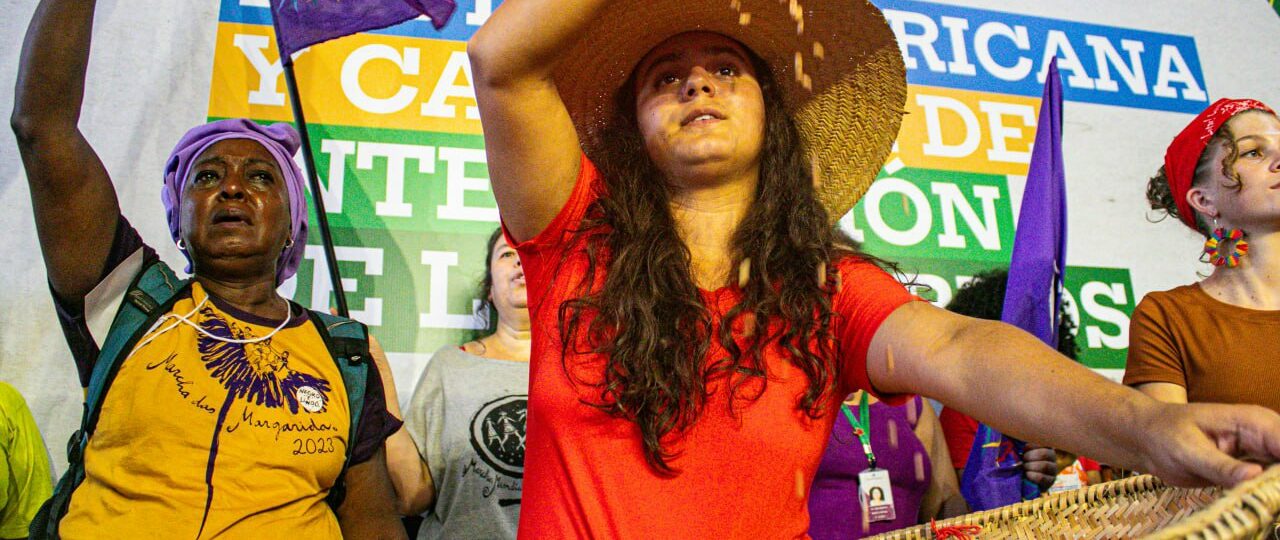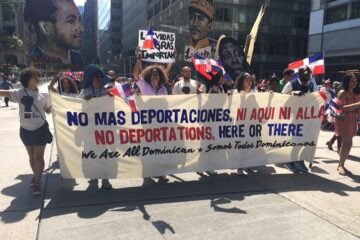Social movements, trade unions, and progressive government representatives met in February 22-24, 2024 in Foz do Iguaçu, in the tri-border area between Brazil, Argentina, and Paraguay in the Southern Cone. And why did they meet? To hold the Conference on the Integration of Latin American and Caribbean Peoples, organized by multiple political subjects throughout 2023.
The conference was attended by more than 3,000 people from all across the continent. It was a fundamental moment to defend peoples’ sovereignty and democracy, as well as a moment for proposals for regional politics to be put forward by the movements. Attendees had the opportunity to listen to and discuss with Francia Márquez, Pepe Mujica, and other left-wing government leaders from Latin America. The intense debate promoted during the conference resulted in a common document, a significant contribution for the shared agenda of grassroots organizations.
Capire, Real World Radio,and the Collective of Women Communicators of the World March of Women Brazil attended the conference and took part in the activities, joined the comms convergence of grassroots movements, and recorded statements by sisters who are points of reference in local and regional struggles. You can read or listen below to the interviews conducted with two of these sisters: Natalia Salvático and Cony Oviedo. Natalia is active with Friends of the Earth Latin America and the Caribbean (ATALC, in Spanish) as a member of Tierra Nativa—Friends of the Earth Argentina. Cony is a member of the Peasant and Indigenous Women’s Organization [Organización de Mujeres Campesinas e Indígenas—CONAMURI] in Paraguay and is currently a deputy member of the International Committee of the World March of Women, representing the Americas.
*
What motivations stand out for the organization of this Conference on Integration amid the current political situation on the continent?
Cony: This is really a historical moment for the World March of Women, as well as for social movements, trade unions, and progressive governments in general. We are seeing the far right rise across the world, so we must think together about the alternatives or agendas we will push forward. We are going to act internationally, because there is no way to do it in isolation, in our territories alone. This is why these two days mean a tremendous effort for all the people who came to Foz do Iguaçu, but they also mean an opportunity to discuss and meet again—something the pandemic has deprived us of and therefore weakened us, which the far right took advantage of to advance.
What this Conference on the Integration of the Peoples proposes is to start meeting together again and review how to unify our agendas. Everyone who is here today wages a specific struggle in the different territories where we conduct our work, whether as a grassroots organization or as part of an international movement.
Natalia, could you talk about grassroots environmentalism and the role of this agenda in the conference? What is the connection between grassroots environmentalism and regional integration?
Natalia: Holding this event is fundamental, as are its implications and consequences. ATALC has a strong belief in the regional union of organizations and peoples, the formulation of proposals and public policies, and the conversation with progressive governments to provide peoples’ sovereignty and promote rights. In this sense, as part of the Continental Day for Democracy and Against Neoliberalism, we pledged to create this space—because we haven’t come together in a meeting since 2019 [in the Havana Meeting].
As Latin Americans and Caribbeans, the environmental issue is fundamental, because it historically has had great relevance on our continent, as we have always supported the rest of the world with our nature. Grassroots environmentalism proposes a social interaction with nature: we don’t see it as something pure and untouched, but we see ourselves as being integrated with it. We contribute a lot to the conversation about nature’s common goods. They are the basis of our peoples’ enormous wealth, but they are also a great risk, because they are constantly being targeted to colonize us and steal them to gain economic power.
The perspective of environmental justice was strongly considered by other organizations who took part in this space, and proposals including food sovereignty, agroecology, and just and feminist transition have been addressed as relevant matters in the discussions. It seems to me that this has not only been a contribution, but also a fruit of grassroots environmentalism, which has been working with organization, pushing its views across sectors, in alliance with feminism, the labor movement, and other social movements.
Last year, there was an important change in the International Committee of the World March of Women during its 13th International Meeting. In 2025, the movement will hold its 6th International Action. Cony, how do you see integration of the peoples in the WMW in the Americas?
Cony: The World March of Women is an international grassroots feminist movement. Integration is a fundamental part of our identity as a movement. The challenges we face are very similar, because what we are seeing in most countries is the return of right-wing governments, often connected to drug trafficking, transnational corporations, and conglomerates that have been making people’s lives increasingly precarious, especially the lives of women and girls. We endure more sexist, patriarchal, and colonialist violence.
Within the WMW Americas today, we are thinking about how to coordinate our agenda with alliances like ALBA Movements, the International Peoples’ Assembly, and the Continental Day for Democracy and Against Neoliberalism, which are our spaces of international coordination and integration. We want to strengthen these spaces and empower ourselves, because we are also going through a difficult moment, of mourning. We have lost our sister Nalu Faria, who was our sister and teacher. We are continuing the internationalist task of promoting integration—which she did her entire life.
Our main challenge is to honor the memory of our sisters who are no longer physically with us, but who have built the WMW and dedicated their lives to building grassroots feminism. They were dedicated to a project that is centered around life, based on good living, feminist and solidarity economy, so that we can defend women and live our lives free of violence. This is related to our slogan “until all of us are free.” It is not any feminism—but grassroots, class-based feminism, with roots and critique.
It was two long, intense days of hard work and very interesting exchanges, discussions, political rallies, and cultural events. How does Friends of the Earth Latin American and Caribbean assess this two-day conference?
Natalia: The great message and our great joy have been to share with other organizations and learn that it is possible to be together. We must commend our sisters and comrades who welcomed us and worked hard to provide a space, food, and transportation, making sure everything ran smoothly. We consider this a historical fact that had not happened in years. We were moved by the speeches of movement and government leaders, who spoke directly with socio-environmental movements. They challenged us to be better, to continue to do strong activism in grassroots environmentalism, for social justice, to achieve the systemic change we pursue and ensure peoples’ dignity. We strongly believe in the agreed-upon agenda that resulted from two days of work carried out by all these people. It was a huge organization, where we were able to express ourselves and propose ways to move forward in the struggle in a deeply unequal region, under attack from neoliberalism, the economic power, and the far right.
I would also like to say that we, from Argentina, feel deeply supported in face of what we are experiencing with a far-right government. The most basic rights of our people are under attack. We felt internationalist solidarity firsthand, but it is also widespread, in the relationship of the peoples with the peoples. This is what we must achieve: the integration of our peoples and the formation of a Great Homeland [Pátria Grande] where we can establish rights for all. Like Francia Márquez said, so that dignity becomes a habit, and not just something “for some, not for others.”
In the document, we see declarations that highlight the role of peasant sisters, of sisters in their neighborhoods, and also the feminist perspective on the economy. Francia Márquez also pointed out that she strongly wanted to have the anti-racist struggle present there. These are fundamental elements, which undoubtedly are the merit of feminist sisters who have been pushing the agenda across sectors for many years. We, environmentalists, are also feminists. That’s where amazing confluences happen. We were there with the feminist drum band, we danced, and being together is something that also must be restored. It’s beautiful when we get together with different organizations, we see how each one organizes and we become equals in the space we share.
Fúria Feminista is a radio show by the WMW and Friends of the Earth’s Real World Radio. Cony, could you talk about the importance of initiatives to strengthen grassroots feminist communications in the region?
Cony: In different moments, but especially in the 1980s, alternative media outlets have emerged precisely to tackle this invisibilization perpetrated by big media outlets. Corporations learned that the media is a tool to spread their narratives, ideas, their discourse. They started to buy outlets. As a response, movements and organizations propose alternative communications. Today, we are doing grassroots feminist communications in several places across our continent and the world. It helps us understand that our perspective, in the media, must be the human rights and gender perspective. Why? So we can not only promote the experience we have as a feminist movement, but also show and expose the inequalities and violence we are talking about. So that what we are talking about can be understood when we are addressing feminism or human rights.
We are in a context where there are anti-rights groups, hate speech and fake news generators. Our battle is against these hegemonic narratives. Grassroots feminism is here to create and strengthen our agenda of struggle, because only it can promote and talk about what we are doing. It will promote our voices, because mass media outlets will not—and, if they do, it will be through criminalization, stereotyping, and violence. So grassroots feminism can bring us the dignity we fight for.




